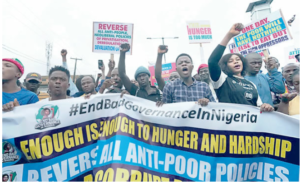#EndBadGovernance Protest: President Tinubu’s Response to Youth Concerns
#EndBadGovernance Protest: President Tinubu’s Response to Youth Concerns
By Leon Usigbe, Abuja Bureau Chief

In response to the #EndBadGovernance protest movement, President Bola Tinubu has taken steps to address the concerns of Nigerian youth regarding the country’s economic hardships. Despite the protest’s seemingly disorganized nature, it has rallied a significant number of young Nigerians dissatisfied with the rising cost of living. The Tinubu administration views the protest as unnecessary, emphasizing its ongoing efforts to mitigate the economic impacts of the petroleum subsidy removal.
Opposition figures, such as Atiku Abubakar, the Peoples Democratic Party (PDP) presidential candidate in the 2023 election, have accused the president of attempting to suppress democratic rights. Abubakar criticized the administration, noting, “It is ironic that those now seeking to stifle these rights once led protests themselves. A responsible government must ensure a safe environment for peaceful protests. Any attempt to suppress these rights undermines democracy.”
President Tinubu countered these accusations, affirming his commitment to democracy while rejecting any protests that lead to violence or property damage. He highlighted his own history of peaceful protest during Nigeria’s military era, stating, “While protests are a democratic right, we cannot support actions that result in harm to lives and property. We have worked hard to ensure 25 years of uninterrupted democracy, and we will continue to uphold it.”
To preempt the planned protest, President Tinubu has engaged various opinion leaders, including traditional and religious figures, politicians, civil society groups, and the media, urging them to dissuade youth from protesting. He has used these opportunities to underscore his administration’s efforts to address economic difficulties.
Prior to the protest’s scheduled start on August 1, organizers circulated a list of demands through social media and other channels. These demands included reducing petrol prices to N100 per liter, addressing insecurity and hunger, closing IDP camps, implementing electoral reforms, investigating the N355 billion electoral budget, releasing detained EndSARS protesters, setting a living wage of N300,000, providing free education, mandating public school attendance for officials’ children, supporting local goods, transitioning to a unicameral legislature, and conducting judicial and constitutional reviews.
As the protest gained momentum online, President Tinubu swiftly urged the youth to reconsider their plans, advising them to allow the government time to address their concerns. Minister of Information and National Orientation, Mohammed Idris, conveyed the president’s message: “The President listens to the youth and takes their concerns seriously. He is committed to improving the country both now and in the future.”
The Tinubu administration advocates for constructive engagement over street protests, referencing past protests such as the “Ali Must Go” demonstrations, which did not lead to immediate resignations but were impactful. The government also views the recent #EndSARS protests as having largely negative outcomes.
Acknowledging the current economic challenges, which the government attributes to the effects of bold policy decisions, the administration remains focused on long-term benefits. Secretary to the Government of the Federation (SGF) George Akume noted that the administration inherited an economy in urgent need of reform, including the removal of the fuel subsidy. Despite the immediate economic adjustments, the government is committed to long-term improvements.
To mitigate the impact of the subsidy removal, the government has released N5 billion to each state, increased the national minimum wage to N70,000, and distributed food aid. It has also removed tariffs on imported food items, subsidized agricultural inputs, and established a Ministry for Livestock Development to address sector challenges.
Furthermore, the administration is promoting infrastructure development, including road construction, and highlighting accomplishments such as the Supreme Court’s affirmation of local government autonomy and the establishment of a N35 billion Nigerian Education Loan Fund (NELFUND).
The Tinubu administration remains hopeful that these initiatives will soon yield positive results, easing economic hardships and paving the way for increased prosperity for all Nigerians.
TRENDING SONGS
 NPMA Appeals to Nigerian Government for Compensation After Lagos Market Fire
NPMA Appeals to Nigerian Government for Compensation After Lagos Market Fire
 Rest Every Four Hours, FRSC Issues Safety Guide for Fasting Motorists
Rest Every Four Hours, FRSC Issues Safety Guide for Fasting Motorists
 NNPC Boss Ojulari Bags UK Energy Institute Fellowship
NNPC Boss Ojulari Bags UK Energy Institute Fellowship
 Shock in Anambra: Bride Disappears Moments Before Wedding
Shock in Anambra: Bride Disappears Moments Before Wedding
 Nigerian Woman Returns ₦330 Million Accidentally Credited to Her Account
Nigerian Woman Returns ₦330 Million Accidentally Credited to Her Account
 APC Don Reach Morocco?’ VeryDarkMan Reacts to Seyi Tinubu Poster
APC Don Reach Morocco?’ VeryDarkMan Reacts to Seyi Tinubu Poster
 Bride Breaks Down in Tears as Wedding Meals Were Kept Secretly While Guests Go Home Hungry
Bride Breaks Down in Tears as Wedding Meals Were Kept Secretly While Guests Go Home Hungry
 Odogwu by Day, Robber by Night: How Marriage Joy Turned Into Tragedy
Odogwu by Day, Robber by Night: How Marriage Joy Turned Into Tragedy
 Nigerian Officials Allegedly Pocket N4–6B Weekly Through Smuggling Cartels at Seme–Badagry Border
Nigerian Officials Allegedly Pocket N4–6B Weekly Through Smuggling Cartels at Seme–Badagry Border
 Ahmad Yerima: Naval Officer to Face No Sanctions After Clash with Wike – Matawalle
Ahmad Yerima: Naval Officer to Face No Sanctions After Clash with Wike – Matawalle
Share this post with your friends on ![]()













